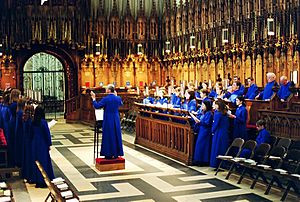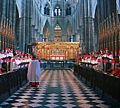Evening Prayer (Anglican) facts for kids
Evening Prayer (often called Evensong) is a special church service in the Anglican Church. People come to church in the late afternoon or early evening to worship. In big churches called cathedrals in Britain and some old university chapels, Evensong is often sung by a choir almost every day. Usually, the choir and priests sing, and the congregation listens. Sometimes, there's one hymn at the end where everyone can sing along. In smaller churches, Evensong usually has more songs for the congregation to join in.
What Happens During Evensong?
An Evensong service usually includes these parts:
- Prayers: The service starts with prayers, including a confession (saying sorry for mistakes) and the Lord's Prayer. If a priest is there, they might also say an absolution (a prayer that says God forgives).
- Responses: These are short prayers sung back and forth by the priest and the choir.
- Psalms: One or two psalms are sung. Psalms are ancient songs or poems from the Bible.
- Bible Readings: Two readings, called lessons, are read from the Bible. The first is usually from the Old Testament (the older part of the Bible), and the second is from the New Testament (the newer part).
- Canticles: After each Bible reading, special songs called canticles are sung. The most common ones are the Magnificat and Nunc Dimittis.
- The Apostles' Creed: This is a statement of Christian beliefs that everyone says together.
- More Prayers: There are more prayers and responses, including the Kyrie eleison (a short prayer asking for mercy) and the Lord's Prayer again.
- Anthem: The choir usually sings a special song called an anthem.
- Final Prayers and Blessing: The service ends with more prayers and a blessing from the priest.
An organist often plays music on the organ before and after the service. On Sundays, there might also be a sermon, which is a talk given by the priest.
Music in Evensong

In many churches, the Magnificat and Nunc Dimittis (the canticles), like the psalms, are sung to a "chant." A chant is a tune that repeats for every verse or two. It's sung in a way that sounds like natural speaking.
In cathedrals or churches with very good choirs, these two canticles are often sung to special music. This music is like an anthem and is written by famous composers. There is usually an organ accompaniment (music played along with the singing).
Many composers, especially those who wrote for the Anglican Church, created special musical "settings" for the Magnificat and Nunc Dimittis. Choir members often call these "Mag and Nunc." Some famous composers who wrote these include Edward Bairstow, Herbert Howells, Henry Purcell, and Charles Stanford. Some composers wrote several settings. To tell them apart, they are often named by the musical key they are in (like "Stanford in G") or sometimes by the cathedral they were written for (like "Howells’ Gloucester Service").
In a fully sung Evensong, the choir also sings a very short piece called an "introit" at the beginning. They will sing a psalm to a chant, and there will also be an anthem.
Related pages
- Morning Prayer
- Matins
- Vespers
- Anglican chant
- Anglican church music
- Service (music)
- Magnificat
- Nunc dimittis
Images for kids
-
Evening prayer often takes the form of Choral Evensong, such as this service at Westminster Abbey.
-
A parish church choir at All Saints' Church, Northampton singing Evensong
-
The choir in procession at a service at St Paul's Cathedral, Melbourne.
 | Percy Lavon Julian |
 | Katherine Johnson |
 | George Washington Carver |
 | Annie Easley |






